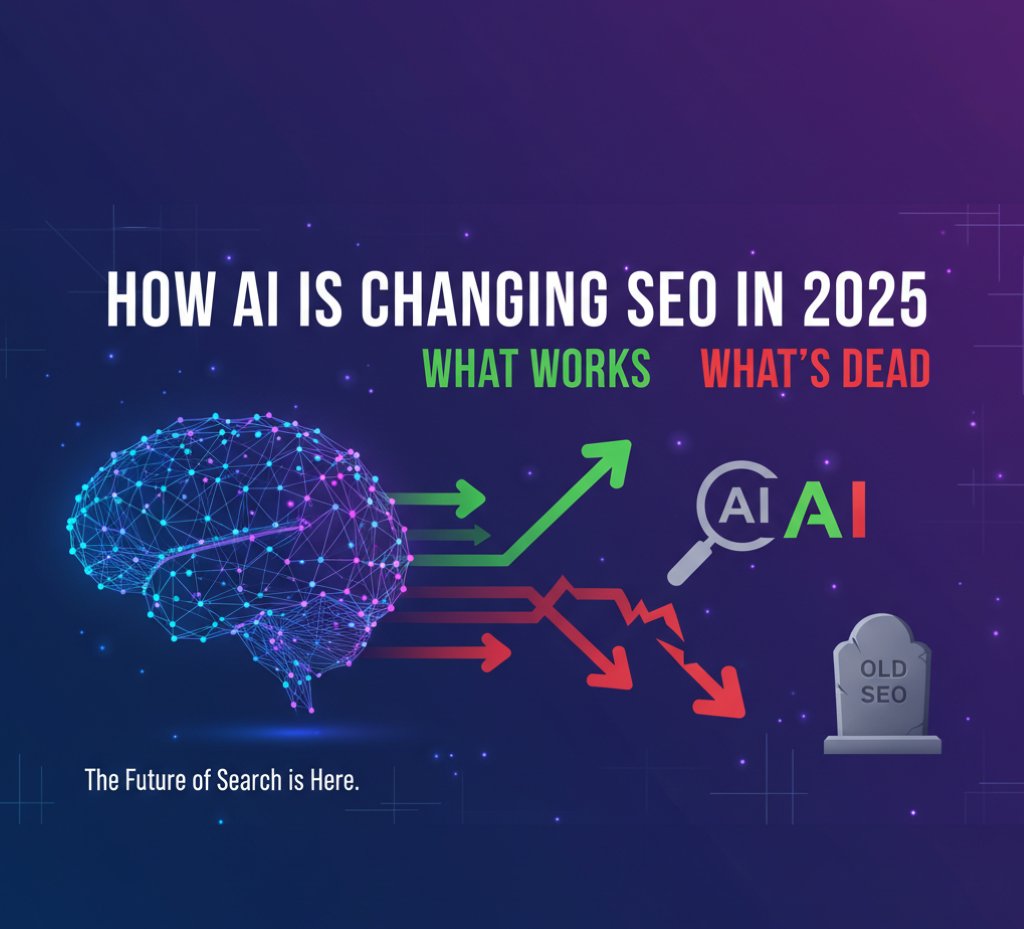We’ve been in SEO for more than a decade, and I can confidently say: 2025 is the most disruptive year we’ve seen so far. AI isn’t just helping with small tasks anymore — it’s now embedded in how we create content, analyze data, and even how Google understands websites.
But here’s the catch: while AI has opened exciting opportunities, it has also killed some old SEO practices we used to rely on. In this post, We will share what I see working today, what’s clearly dead, and how SEOs like us should adapt.
What’s Working in 2025
AI-assisted content (with real expertise added)
I often use AI tools like Jasper or ChatGPT to draft outlines or generate variations of meta descriptions. But here’s what I’ve noticed — if you publish content as-is, it rarely ranks. The winning approach is AI + human editing. When I add my insights, examples, or real-life case studies, that’s when content gets traction. One of my client, I would not like mention his website here, drafter around 2000 blogs on different topics using AI tools & scheduled to publish it every day, hoping his website content will remained fresh.
Result : His website not penalized by Google but also not getting any visibility because of no depth in the content

SEO automation
We have personally built automations using AI to handle routine tasks like keyword clustering, SEO audits, and reporting. This saves my team hours every week. AI isn’t replacing us, but it’s making us far more efficient.
Entity-based optimization
Google’s Knowledge Graph has matured a lot. Optimizing for “topics” and “entities” (not just keywords) has become crucial. For example, instead of writing only about “SEO tools,” I connect the content with known entities like SEMrush, Ahrefs, or Screaming Frog — and rankings improve.
User intent and experience
One thing hasn’t changed: if users bounce, you lose. Core Web Vitals, site speed, and content that matches intent are still non-negotiable in 2025.
What’s Dead or Dying
Keyword stuffing
I still see some websites overusing keywords, but those sites rarely survive the next core update. Context – Keywords now.
Thin AI content
This is a big one. Many people pumped out 100s of AI-written blogs in 2024, and now in 2025 those sites are losing traffic fast. Google is getting better at spotting generic AI fluff.
Spammy backlinks / PBNs
Link schemes used to work in the past, but in my recent audits, I’ve seen multiple sites tank because of toxic link profiles. High-quality, relevant links are the only safe path now.
Manual reporting
Honestly, We haven’t opened Excel for SEO reports in ages. With GA4 dashboards and AI-based analytics, clients expect real-time insights, not static monthly PDFs.
How SEOs Should Adapt in 2025
- Use AI for efficiency, not shortcuts : Let AI handle the boring stuff (drafts, clustering, reporting), but always add your expertise.
- Double down on E-E-A-T : Experience, Expertise, Authority, Trust. For my own clients, adding author bios, case studies, and even client testimonials boosted trust signals.
- Think in entities, not keywords : Build topical authority around concepts, not just individual terms.
- Be proactive with updates : Core updates are faster and harsher now. Regular audits and pruning underperforming content is key.
Tools I Recommend (What I Actually Use)
- SEMRush : Keyword research + competitive analysis.
- Ahref :Brand Radar, it is paid version
- Screaming Frog : Technical SEO audits.
- SurferSEO : On-page optimization.
- GA4 + Looker Studio : Reporting and analytics dashboards.
- Custom AI scripts : For automating repetitive SEO tasks (I’ve built some myself).
Final Word
SEO in 2025 isn’t dead — it’s evolving. AI won’t replace SEO professionals, but SEOs who know how to use AI effectively will replace those who don’t.
From our experience, the secret is simple: embrace AI, but don’t rely on it blindly. Add your human expertise, case studies, and strategy on top of it — that’s how you stay ahead in this new era of search.




